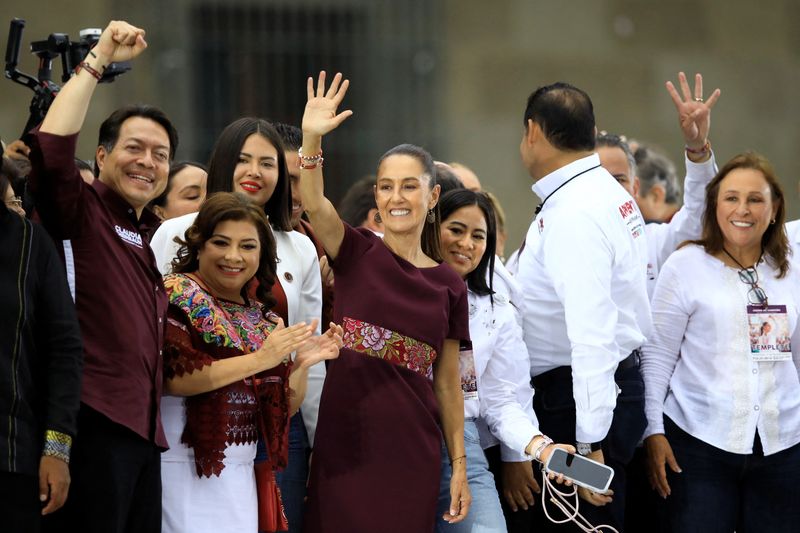By Diego Oré
MEXICO CITY (Reuters) - When Claudia Sheinbaum - the frontrunner to become Mexico's next president - was just six years old, her parents were active participants in protests during one of the darkest periods of the country's modern history.
It was 1968, the Institutional Revolutionary Party had governed Mexico with an iron fist for decades and the country was swept by large demonstrations pressing for democratic change. In one horrific incident, as many as 400 students at a protest were killed by soldiers and paramilitary forces.
The tragedy only galvanized her parents and Sheinbaum grew up in a family steeped in activism.
Now the clear favorite to succeed popular President Andres Manuel Lopez Obrador in Sunday's election and likely make history as Mexico's first female president, Sheinbaum, 61, says she owes much to her chemical engineer father and cellular biologist mother.
They bestowed a passion for politics, a love for nature and a deep interest in science, she said in a biopic released last year that was directed by her son.
"I grew up with that duality - a belief that politics can transform the world alongside an academic and scientific mindset," reflected Sheinbaum.
Looking back, it seems only natural that she would go on to be a student protester, a climate scientist and a politician.
Sheinbaum's values aligned with Lopez Obrador's policies which she has pledged to continue.
She wants to assume his mantle as a defender of the state, cement public control of natural resources, as well as strengthen his welfare programs and flagship infrastructure projects. In a slight departure, she has called for a greater emphasis on renewable energy usage.
FROM PROTESTS TO POLITICS
The second of three children, Sheinbaum hails from a Jewish family, including her mother's parents who migrated to Mexico from Bulgaria as they fled Nazi aggression in the 1930s.
Growing up in Mexico City, Sheinbaum learned to play the guitar and studied ballet, details that her critics have used to paint her as elitist and out of touch with ordinary Mexicans.
Her activism started early.
At 15, she volunteered to help groups of mothers searching for their missing children, a long-standing plight in a country with a history of raging gangland violence.
Around that time she met leading human rights activist and leftist politician Rosario Ibarra, who would later be the first woman to run for president in 1982. Sheinbaum later would go to say that her ruling left-wing MORENA party had taken on Ibarra's struggles.
Sheinbaum became an active participant in student movements during the 1980s, joining protests against state intervention in education policies.
In 1995, she earned her doctorate in energy engineering from the National Autonomous University of Mexico. As she prepared her doctoral thesis, she spent time at the University of California at Berkeley in the United States, where she polished her fluent English.
Sheinbaum pursued a teaching and academic career in the years that followed, including a stint on the U.N.'s Intergovernmental Panel on Climate Change (IPCC), which would later share a Nobel Peace Prize with former U.S. Vice President Al Gore.
Her political career kicked off in 2000, when Lopez Obrador, then-Mexico City's newly elected mayor, tapped her to be his environment chief. He had only recently met her, but was clear he wanted a scientist with progressive values to help deal with the megacity's acute pollution and transportation snarls.
She left City Hall to take on the role of chief spokesperson for Lopez Obrador's first campaign for president in 2006 which he narrowly lost.
In 2015, she was elected to run Mexico City's largest borough, Tlalpan.
In that post, she faced allegations of poor management after a 2017 earthquake caused the collapse of an elementary school, killing 19 children. The school had only recently been expanded with an extra floor.
But that did not stop her from notching up a historic election victory as the capital's first woman mayor in 2018, the same year that Lopez Obrador's third run for the presidency proved successful in a landslide win.

During her tenure, she won plaudits for improving security with the capital's murder rate falling 50%.
But she was also criticized for a 2021 subway accident that left 26 dead, an incident that was later blamed in part on insufficient safety inspections and deferred maintenance on her watch. Sheinbaum denied maintenance was to blame.